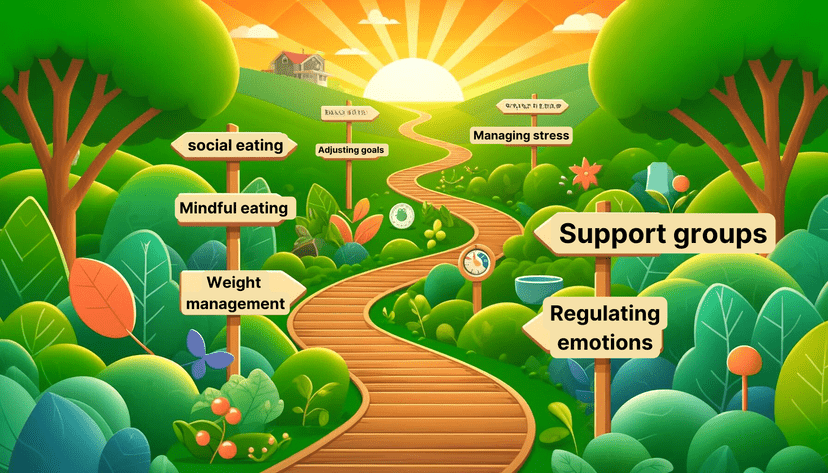Your commitment needs to align with your expectations for fat loss

Setting Realistic Fat Loss Goals
The journey to weight loss, specifically fat loss, requires careful planning and setting clear impactful expectations. Recognizing the importance of setting realistic goals for fat loss is paramount and can make the difference between fleeting success and long-term healthier you. The core concept behind achieving sustainable fat loss revolves around understanding the fundamentals of weight loss, creating measurable and achievable goals, and focusing on sustainability.
Understanding the Fundamentals of Fat Loss
The cornerstone of weight loss is predominately centered on a straightforward principle: energy balance. It insinuates that your body will shed weight when the calories burned exceed the calories consumed, a state often referred to as creating a caloric deficit. If you consume more calories than you burn, you will gain weight.
There is a two-faceted approach to achieving this caloric deficit: diet and exercise. A nutrient-dense diet that is lower in calories, combined with regular physical activity, can aid in creating this energy imbalance. Nevertheless, it’s vital to consult with a registered dietitian or a healthcare provider before implementing any drastic changes to your diet or physical activity levels.
While the principle of energy balance is foundational, slight variations in metabolism, physical activity, and genetic predisposition can influence individual weight loss. Therefore, although this principle offers a base understanding, it doesn’t entirely encompass the complexity of human body weight regulation.
Creating Achievable and Measurable Goals
Once you've grasped the basics of fat loss, the next step is setting achievable and measurable goals. Unrealistic and overly-ambitious objectives can lead to disappointment, dissatisfaction, and ultimately, attrition from your weight loss program.
A SMART (Specific, Measurable, Achievable, Realistic, Time-framed) goal-setting approach is often beneficial. Instead of a broad goal such as “I want to lose weight”, a SMART goal might be “I aim to lose 1-2 lbs per week for the next three months through a combination of regular exercise and an intake of 500 calories less per day.”
Additionally, supplementing long-term goals with short-term objectives can foster encouragement and motivation. You could incorporate daily or weekly goals such as ensuring a minimum of 5 servings of fruits and vegetables per day, exercising for at least 30 minutes, or drinking at least 64 ounces of water.
The Importance of Sustainability in Goal Setting
While setting and achieving goals are vital, the more significant challenge lies in maintaining the progress. Hence, sustainability is imperative in weight loss goal setting. Crash diets and strenuous workout regimens might give quick results, but they are not feasible long-term strategies. Many people struggle with the “yo-yo” effect, losing, and then regaining weight.
Adopting healthier eating habits, cooking more home meals, and finding a type of exercise you genuinely enjoy can contribute to sustainable behaviors. It's not about perfection but rather about progression. Each small step taken towards a healthier lifestyle can make a big difference in maintaining long-term weight loss. Consistency is key to turning these new habits into a lifestyle.
In conclusion, while everyone's weight loss journey is uniquely their own, these fundamental steps can assist in creating an effective roadmap. By understanding the principles of fat loss, setting achievable goals, and focusing on sustainability, you can set yourself up for a healthier, fitter future.
The Role of Personal Commitment in Fat Loss
The journey towards fat loss is a multifaceted one, involving not just physical effort but an equally, if not more, investment of mental and emotional energies. One critical aspect that can profoundly determine the extent of your success in achieving fat loss goals is your personal commitment.
Personal commitment in the context of fat loss signifies the consistent, disciplined, and resilient pursuit of a healthier and fitter version of oneself. This commitment manifestly influences the decisions you make and the habits you form, ultimately dictating your long-term success.
Consistency and Discipline: The Keys to Success
Consistency and discipline are two indispensable elements for effective fat loss. They are the bricks and mortar that build and sustain the structure of a healthier lifestyle, enabling you to continuously progress towards your goal.
Consistency refers to the regular and constant effort you put into your workouts, dietary choices, and lifestyle habits. It is about cultivating a routine that becomes almost second nature over time, enabling you to take steps towards your goal each day relentlessly.
Discipline, on the other hand, is your ability to control and motivate yourself, to stick to your healthy habits and resist the temptation to revert to previous harmful patterns. This self-control is crucial in scenarios of fatigue, frustration, or boredom, when the temptation to abandon the established routine is high.
Together, consistency and discipline help establish and fortify a pattern of behavior that sets the foundation for successful fat loss.
Overcoming Challenges and Staying Motivated
The journey of fat loss is not a straight path. There will be hurdles, pitfalls, and even detours. However, these challenges should not deter you. Instead, they should bolster your resilience and encourage you to find ways to overcome and keep moving forward.
Resilience in the face of setbacks is the true test of your commitment to fat loss. Never losing sight of the bigger picture, the aim should always be improvement and growth, regardless of the challenges encountered.
Staying motivated is just as important as building resilience. Motivation fuels your drive to remain disciplined and consistent, propelling you to march on, even in adverse situations.
Aligning Daily Choices with Long-Term Goals
Another crucial element of personal commitment in fat loss is aligning everyday choices with your long-term goals. This means that every decision you make – from the food you choose to consume, the hours you sleep, the effort you invest in your workouts – should be illuminated by the light of your ultimate goal.
It's critical to carefully consider daily choices as they leave a significant impact on your progress. Actively opting for choices conducive to your well-being and fat loss aspirations is a concrete display of your personal commitment to a healthier future.
By consciously choosing to align your daily actions with your fat loss goals, you can create a seamless synergy that naturally propels you towards a healthier lifestyle.
The role of personal commitment in achieving your fat loss goals is vital. It's the underpinning force that enables consistency, discipline, resilience, and the alignment of daily choices with long-term goals, affirming your path towards a healthier, fitter self.
Aligning Expectations with Commitment
When embarking on a journey towards fat loss, one critical aspect to consider is aligning your expectations with your commitment. This means having an accurate understanding of what you can realistically achieve given the level of time, effort, and resources you're willing to invest.
Firstly, understanding the relationship between your expectations and your commitment is essential. High expectations coupled with low commitment can lead to disappointment, potentially causing you to abandon your fat loss goals prematurely. On the other hand, low expectations paired with high commitment can also hinder progress since you might not push yourself as hard as you potentially could.
Evaluating and Adjusting Expectations Over Time
It's important to periodically evaluate your expectations as they might not always align with your commitment or outcomes. Just as your body changes over time, your goals, objectives, and motivation also fluctuate. Hence, it's essential to adjust your expectations over time.
An effective way to evaluate your expectations might involve:
- Examining your daily routine and lifestyle changes
- Assessing your dietary and physical activity levels
- Reflecting on the outcomes achieved from your fat loss endeavors
If there's a significant disconnect between your expectations and reality, adjustment becomes necessary.
The Impact of Unrealistic Expectations on Motivation
Unrealistic expectations can severely impact your motivation and derail you from your overall fat loss objectives. You might set out with the goal to lose a certain amount of weight within a short period, yet the human body does not operate based on timelines. It has its unique rhythm and pace.
Placing immense pressure on oneself to achieve unrealistic weight loss goals can lead to unhealthy behaviors such as:
- Extreme dieting: This can lead to nutrient deficiencies and serious health risks.
- Over-exercising: Which can cause injuries and burn-out.
- Psychological stress and anxiety: That could impact your wellbeing.
These could potentially harm your long-term health, hence the importance of maintaining realistic expectations cannot be overstressed.
Strategies for Recommitting to Your Goals
Life is filled with ups and downs, and the journey towards fat loss is no different. Progress is rarely linear, and setbacks are a normal part of the process. So, when you face setbacks, do not beat yourself up; instead, use this as an opportunity to recommit to your goals.
Here are some strategies for recommitting to your fat loss goals:
-
Re-evaluate your expectations: Ask yourself if your initial expectations were realistic. It's important to approach fat loss with a growth mindset, having the willingness to learn and adapt.
-
Set achievable, short-term goals: Setting small, achievable goals can help maintain motivation and give you a sense of accomplishment.
-
Celebrate small wins: Recognize
your progress, no matter how small. Celebrating these small wins can boost your self-confidence and motivate you to carry on.
- Find your "why": Having a strong, emotional reason to lose weight can keep you motivated, even during tough times. Remember why you started this journey in the first place, and let that guide you when things feel challenging.
Remember, your journey towards fat loss is a marathon, not a sprint. You need to keep aligning your expectations with your commitment for a healthier, happier future.
In Summary
A successful fat loss journey is a well-balanced combination of understanding the fundamentals of fat loss, setting measurable and achievable goals, and focusing on sustainability. Central to this is the concept of energy balance, where the goal is to create a caloric deficit through a combined approach of diet and exercise.
One must remember that consistency and discipline form the key to achieving fat loss goals, with resilience being a significant determinant of success. Ensuring your daily choices are in line with your long-term goals is critical.
Additionally, a crucial aspect to consider is aligning your expectations with your commitment to prevent premature withdrawal from the fat loss journey or not pushing yourself enough. It is also essential to adjust your expectations over time and recommit to your goals when faced with setbacks.
To put this information into practice, here is a step-by-step plan of action:
-
Educate yourself: Understand the science behind fat loss, especially the concept of energy balance and caloric deficits.
-
Set SMART Goals: Aim for goals that are specific, measurable, achievable, realistic, and time-framed.
-
Prioritize Sustainability: Focus on making small, sustainable changes in your diet and physical activity that can be maintained over a long duration.
-
Maintain Consistency and Discipline: Implement a consistent and disciplined approach towards your diet, exercise, and lifestyle habits.
-
Be Resilient and Stay Motivated: Expect setbacks and be prepared to overcome them. Keep your motivation levels high.
-
Align Daily Choices with Long-Term Goals: Align your daily food, sleep, and exercise choices with your long-term fat loss goals.
-
Align Expectations with Commitment: Maintain a realistic outlook on your fat loss journey which matches your level of commitment.
-
Reevaluate and Adjust Expectations: Assess your progress periodically, and don't hesitate to adjust your expectations and goals if needed.
By following this plan of action, you can set yourself up for a successful and sustainable fat loss journey.




